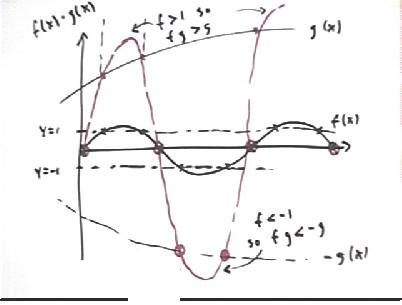Precalculus I Class 04/22
What is the y = A b^x form of the exponential function thru the points (1, 5) and (6, 9)? What is the y = A e^(kx) form of this function?
Recall that to fit three points to a quadratic we substituted the coordinates of those points into the form y = a t^2 + b t + c of a quadratic.
Now we have two points. What form do we fit to these points?
The requested form is y = A b^x.
Plugging in the coordinates of our points we get
5 = A b^1
9 = A b^6.
We can solve these equations by dividing the second equation by the first, obtaining
9/5 = (A b^6) / (A b^1), which we simplify to get
1.8 = b^5. Taking the 1/5 power of both sides we have
(b^5)^(1/5) = 1.8^(1/5)
b = 1.125.
Now substituting b = 1.25 into the first equation we get
5 = A * 1.125^1 so that
A = 5 / 1.125 = 4.
Our y = A b^x function is therefore
y = 4 * 1.125^x.
The y = A e^(kx) form is obtained by setting b^x = e^(kx)
b^x = e^(kx) so
1.125^x = e^(kx). Since e^(kx) = (e^k)^x we have
1.125^x = (e^k)^x so
e^k = 1.125. Taking natural log of both sides we get
ln(e^k) = ln(1.125) or
k = ln(1.125) = .1178.
So the y = A e^(kx) form of the function y = 4 * 1.125^x is
y = 4 * e^(.1178 x) .
If f = 0 then
If f = 1 then
If f = -1 then
Between consecutive zeros and/or asymptotes (if functions continuous between zeros and asymptotes):

Recall last class we obtained the equation
T = A e^(k t) + Troom , A not zero.
If we know that the temperature of a glass of water is 100 degrees when t = 0 and 60 degrees when t = 20 minutes, while Troom is 40 degrees, what are the values of A and k?